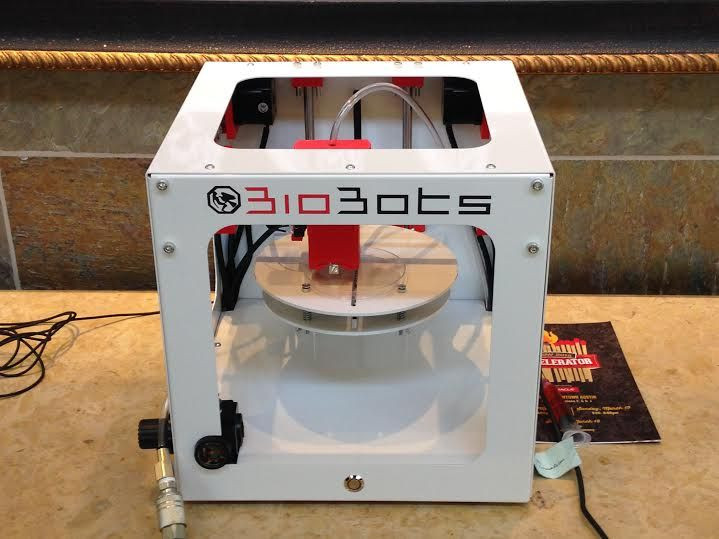Tinnitus Help, 3D-Printed Tissue, Anxiety Relief Highlight Digital Health Startups At SXSW 2015

AUSTIN, Texas -- More than 123,000 people in the United States are on an organ waiting list, according to the American Transplant Foundation. And, on average, 21 people die every day because of the lack of available organs.
What if all those people could just fire up their laptops and click “print”?
We’re not there yet, but technology is rapidly moving in that direction thanks to companies like BioBots, a Philadelphia startup that makes 3D bioprinters capable of printing living human tissue and is one of the numerous health-related technologies on display here at the South by Southwest Accelerator competition -- the festival’s annual battle of the startups.
“The kind of morbidity associated with getting a transplant from someone else right now, or waiting on a list to get an organ, is horrific,” Sohaib Hashmi, BioBots’ 24-year-old co-founder, said. “So many people are dying. Even after you get your transplant, you have issues with rejection. So one part of the puzzle is, ‘Can you give them something that has their own cells that their body isn’t going to reject?’”
Danny Cabrera, 22, another BioBots co-founder, admits that we are decades from printing full human organs, but he said bioprinting has numerous practical uses in the here and now. BioBots makes a 12-inch cube printing apparatus that is already being adopted by academic researchers, and he said 3D-printed cell tissue is accelerating the pace of development for new drugs.
“With these different materials and these inks, you can really begin to build miniature organ models,” Cabrera said. “You can begin replacing animals in drug screenings. Suddenly, for the first time ever, you can test drugs on 3D human tissues without using people.”
It sounds like science fiction, but this is SXSW, where bizarre ideas come to gestate, and can go on to change the world. (Siri, that familiar little voice in your iPhone, was an SXSW Accelerator alum before Apple gobbled it up.)
At this year’s competition, the Digital Health category has proven to be the most fascinating amid a wider trend of health-related technologies -- from mobile apps that track vital signs to video-conferencing networks that connect health professionals to patients -- already exploding on to the marketplace.
“It’s one of my favorite categories,” Chris Valentine, SXSW Accelerator’s event producer, said. “When you think about it, these companies are doing such incredible things.”
Better Hearing Through Music
It’s not all about 3D printers and wearables. The Accelerator competition included devices that turn mobile phones into cancer-detection devices and blood diagnostic screeners, among other things. But the winner of this year’s competition was perhaps the timeliest. Tinnitracks, a product from German company Sonormed, uses filtered audio therapy to treat symptoms of tinnitus, or ringing in the ears. The product is based on the concept that tinnitus patients can retrain their brains by listening to music that filters out certain frequencies. Tinnitracks tailors the therapy to each patient’s specific tinnitus frequency, and even lets patients choose their own music.
Joerg Land, Sonormed's managing director, received a resounding applause Saturday when he took the stage to explain how the product works. About 50 million Americans suffer from tinnitus, which is often caused by exposure to loud noises. It’s a particularly troublesome problem for concert-going baby boomers and is only expected to get worse as a generation weaned on iPods and earbuds reaches middle age.

Tinnitus and anxiety often go hand in hand, and for the latter there’s Litesprite -- an Accelerator finalist -- which makes games to help manage chronic health conditions. Based near Seattle, the company came to SXSW to show its first game, “Sinasprite,” the object of which is to help a character named Socks the Fox become a Zen master through a series of soothing challenges.
The game, which targets anxiety, stress and depression, is a pilot project for the U.S. Army, where it will be offered in primary care clinics for post-trauma military personnel and their families. Swatee Surve, Litesprite’s chief executive, said the game’s format was created around cognitive-behavior strategies used by therapists and clinicians. She said therapeutic games can work in conjunction with traditional therapy or provide help to patients who don’t have access to live therapists.
“Even if you're not diagnosed, even if you're just highly stressed, these techniques will work,” Surve said.
Paging Doctor Data
Speaking of anxiety, few things spur more of it among privacy advocates than the idea of surrendering sensitive health information to tech companies, particularly if they have a spotty track record when it comes to protecting data. Last year, when Facebook Inc. was rumored to be thinking about creating online “support communities” for users who suffered from certain health conditions, groups like the American Civil Liberties Union were quick to express their concern.
Sergio Radovcic, chief marketing officer for Healthiest You, a health care management platform appearing at SXSW’s MedTech Expo, said health-related tech companies have to take extra care to ensure compliance with the Health Insurance Portability and Accountability Act, or HIPAA, which regulates the use and disclosure of sensitive health information. He said one way to do that is not to collect or store any information that can link specific users to their conditions.
“When we talk about safety, the safest way not to get robbed when you’re in a foreign country is to not have a camera around your neck,” he said. “So we believe the safest way not to get hacked is not to have the data.”
A data breach at a digital health company could quickly turn into a nightmare scenario if sensitive information falls into the wrong hands. Valentine said he sees security companies “coming out of the woodwork” just to focus on data security in the medical space. He also said the train has left the station on digital health technology, and that consumers’ misgivings about it are likely to soften over time as larger, more familiar tech companies continue to roll out health-related products.
“What will ultimately happen is that Apple, or somebody that people trust, will do something,” he said. “It’s like doctors. There’s this trust in doctors, and people don’t care if their doctors are impossible to deal with as long as they can feel like they can trust them.”
Christopher Zara is a senior writer who covers media and culture. News tips? Email me here. Follow me on Twitter @christopherzara.
© Copyright IBTimes 2025. All rights reserved.




















